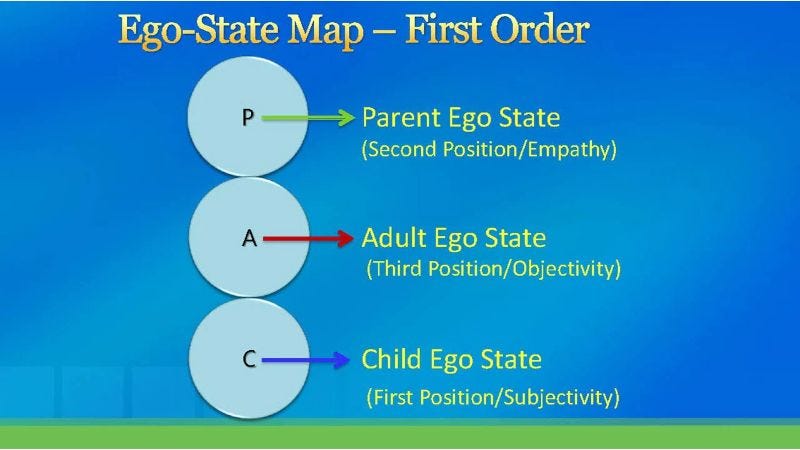Relationship Traps, Ego-States, & NLP Perceptual Positions
When to be "All-About-Others", "All-About-Self", or "All-About-Optics"?
NLP Perceptual Positions provide a way to see and explain what happens when a person becomes "All-About-Others" at the expense of their own self-care, "All-About-Self" at the expense of important people in their life, or "All-About-Optics" and why these perceptual positions are not a bad thing in-and-of themselves. In fact, these are critical skills for healthy relationships. (Note: The links in this article lead back to my Blog for those who want to learn more.)
Codependent and addictive relationship positions are about being stuck in one position without the flexibility to move – That’s why it feels like a trap. This is due to operating out of survival-mode which is when we are “triggered” into our life script and emotional themes.
Actually, the NLP Perceptual Positions listed here are very healthy … IF the person using them has the ability to move flexibly and choicefully out of one position and into another. So, it is not being in any of the following positions that can cause problems – quite the contrary! Being able to use each position to gain information is an art that will serve us well. It is getting stuck in one of these positions that causes problems.
First Position (All-About-Self)
When you associate into your own body, you are in first position.
You look, feel, and hear the world from your own viewpoint.
In first position, you do not take into account anyone else’s position… You simply think, “how does this conversation or communication affect ME?”
Healthy use of First Position is called Self-Awareness… it’s the position I must take to discover what I want, what I need, who I am in this situation or relationship – i.e, the Child Ego State.
When the Externalizer gets stuck in first position s/he operates from the Angry/Defiant Child ego-state and assumes the Persecutor role, thinking and feeling in selfish, “all-about-me” ways.
When the Internalizer gets stuck in first position s/he operates from the Vulnerable Child ego-stateand assumes the Victim role, thinking and feeling in highly dependent, “I’m helpless-hopeless-or-worthless” ways.
When addiction is present, Internalizers get stuck in the “Poor me, pour me another” mindset and Externalizers get stuck in the “kid in the candy store without parental supervision” mindset.
Second Position (All-About-Others)
Healthy use of Second Position is called Empathy… This position offers much flexibility when involved in a conflict with another person. It’s also extremely valuable for deepening rapport with others. This is the focus of the Parent Ego State
This means stepping into the other person shoes… Taking into account how an event or communication would look, feel, and sound from that person’s point of view – as if you were using their eyes and ears (associated into their body).
Imagine you’re entering the other person’s body, in this position remembering whatn youn knowm about this person, imagine looking back at yourself through their eyes… What do you look like, sound like, and what feelings you get from the other person’s viewpoint of you.
When the Externalizer gets stuck in second position, s/he operates from the Critical Parent network and takes the role of Persecutor in the Drama Triangle.
When the Internalizer gets stuck in second position, s/he tends to become other-centered and takes the role of Rescuer in the Drama Triangle. He or she “caretake” a Victim from either the Critical Parent ego-state… re-enacting the parenting s/he got as a child or a Projected Nurturing Parent ego-state… an attempt to experience the healthy parenting s/he did not get herself as a child.
Third Position (All-About-Optics)
Stepping out of the entire event or conversation, adopting an independent observer role allows us to gain a new perspective… “how would this conversation/event look, sound, and feel to someone totally uninvolved?”
Imagine yourself being out of your body and off to the side of the conversation between that you and that other person, you can see both yourself and the other person…”those two over there”. It’s a good way to “step out of” an emotionally intense situation. (Dissociated)
Healthy use of Third Position is called Objectivity, or in Alanon terms, it’s referred to as “Detachment” when used in a healthy way… such as emotionally detaching from dysfunctional behaviors like those of the Drama Triangle. In TA terms, it’s the Adult Ego State.
Third Position is a good position from which to study yourself and your relationships. Think of it like being a bird in the corner of the room watching those two down there…or an innocent bystander watching those two strangers over there with curiosity.
If we get stuck in the third-position, we tend to intellectualize and analyze situations…so that we become so dissociated from our body and emotions that we seem more like robots than people (the computer role).
Stuck in Third Position is the position of the Emotionally absent or Disengaged partner, typical of many Externalizers in a codependent relationship. They stay in the Adult ego-state to distance or block themselves from the painful emotions of the Vulnerable Child or the volatile emotions of the Angry Child.
Stuck in Third Position is also the position of “Impression Management” or “What Would Other People Think” Syndrome, typical of many Internalizers in a codependent relationship. In their inner world of emotions, they tend to stay primarily in the Vulnerable Child ego state where they internally experience their fear of more abandonment and so must call on their Adult ego-state to hide their inner state by externally managing the impressions of others. Saying NO is difficult causing a lack of adequate boundaries.



